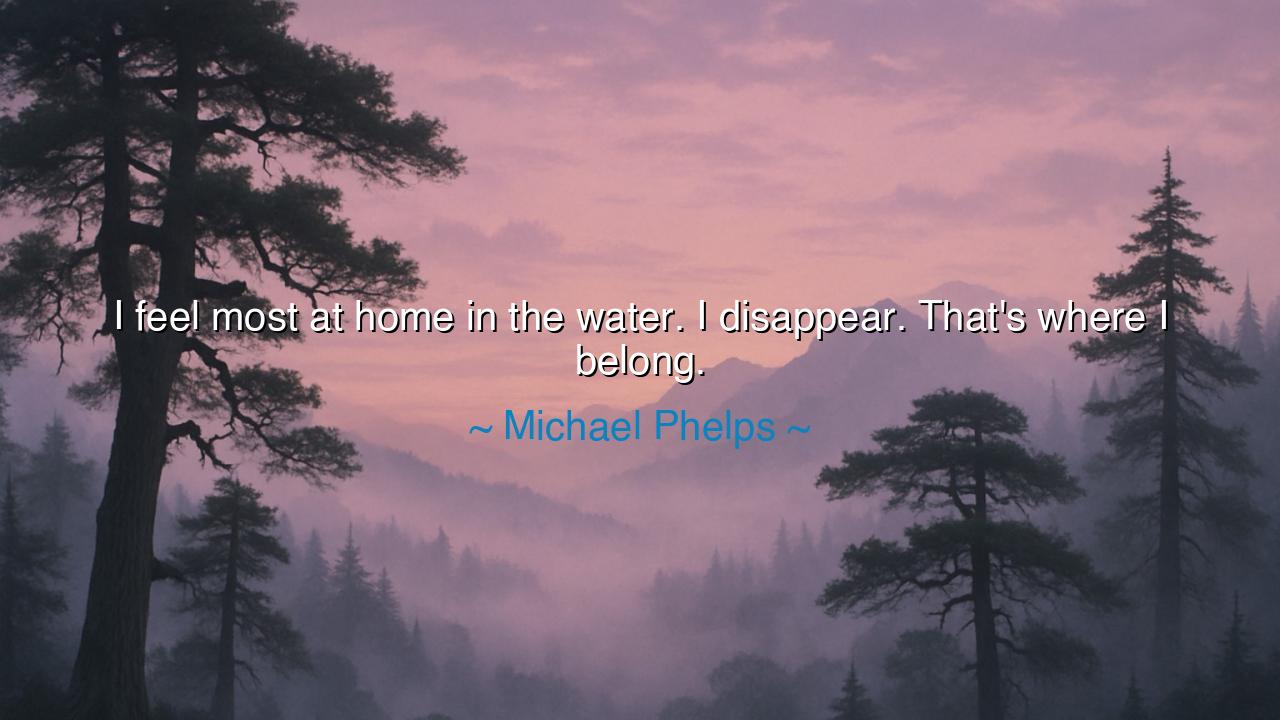
I feel most at home in the water. I disappear. That's where I






In the words of Michael Phelps, the champion of the waters and bearer of more Olympic gold than any other mortal, we hear a confession that glimmers with both simplicity and transcendence: “I feel most at home in the water. I disappear. That’s where I belong.” These words, though spoken by an athlete, rise beyond sport and enter the realm of spirit. They speak of the place where one’s being dissolves into purpose, where self and struggle vanish, and the soul becomes one with its element. It is not merely about swimming — it is about finding the medium through which life itself becomes effortless, natural, and divine.
To “feel most at home in the water” is to return to one’s true origin. For from water all life was born, and to water, all beings are bound. In it, Phelps finds not resistance but release. When he says, “I disappear,” he describes that sacred state known to the ancients as kenosis — the emptying of the self, the surrender of ego into the greater flow of existence. Just as rivers yield themselves to the sea, he yields his body to motion, his mind to stillness, his heart to the rhythm of breath and tide. There, he ceases to be Michael Phelps the man and becomes simply — movement.
This feeling of belonging to one’s craft, of merging with it so completely that the boundary between self and act fades, is the essence of mastery. The ancient warriors of Japan called it mushin no shin — “the mind of no mind.” The philosopher Lao Tzu called it “the Way.” And in the still depths of his lane, Phelps calls it home. He is not running from the world; rather, he is returning to his center, to that rare and holy place where effort ceases and being begins. There is no applause in the water, no noise of fame — only silence, pressure, and light.
History remembers others who found this same belonging in their chosen element. Leonardo da Vinci, who saw the flight of birds and felt his spirit soar with them, wrote endlessly of the sky. “Once you have tasted flight,” he said, “you will forever walk the earth with your eyes turned upward.” For him, the air was what water was to Phelps — a place where the spirit could move freely, unbound by gravity or the limitations of flesh. In both men, we find the same truth: that greatness blooms when one finds the world that mirrors the soul’s nature and dwells there completely.
To disappear within one’s purpose is not to lose oneself, but to find the truest version of self — the one unburdened by fear, pride, or doubt. Phelps’s words whisper a universal wisdom: that joy arises not from domination, but from union. Whether you are a swimmer, an artist, a teacher, or a builder of dreams, you must discover your own element — the place where your being aligns so perfectly with your doing that the world around you falls away. In that moment, you no longer strive; you simply are.
But this belonging does not come easily. Phelps’s mastery was born from sacrifice — years of repetition, pain, and solitude. To disappear into greatness, one must first endure the breaking of self. Just as a diver must trust the deep, so too must the seeker trust the journey. There will be struggle, resistance, and fear — yet through them, one finds peace. The water is both sanctuary and trial, just as life is. And in that paradox lies its truth: the place where you most belong will also be the place that demands your greatest surrender.
The lesson, then, is clear and eternal: find your element, and dwell there without fear. Listen to the call that quiets the noise within you, that place where effort turns to ease, where time ceases, and where your spirit feels at home. Whether it be the water, the pen, the soil, or the song — when you discover it, disappear into it. Let yourself be consumed by the rhythm of what you love, and you will find not emptiness, but eternity.
So remember, O listener, the wisdom of Michael Phelps, who found his home not in gold or glory, but in the silent depths of water. To disappear in your purpose is not to fade, but to be reborn — to flow as freely as the ocean, to move as naturally as the tide. For when you finally find where you belong, you do not conquer the world — you become it.






AAdministratorAdministrator
Welcome, honored guests. Please leave a comment, we will respond soon